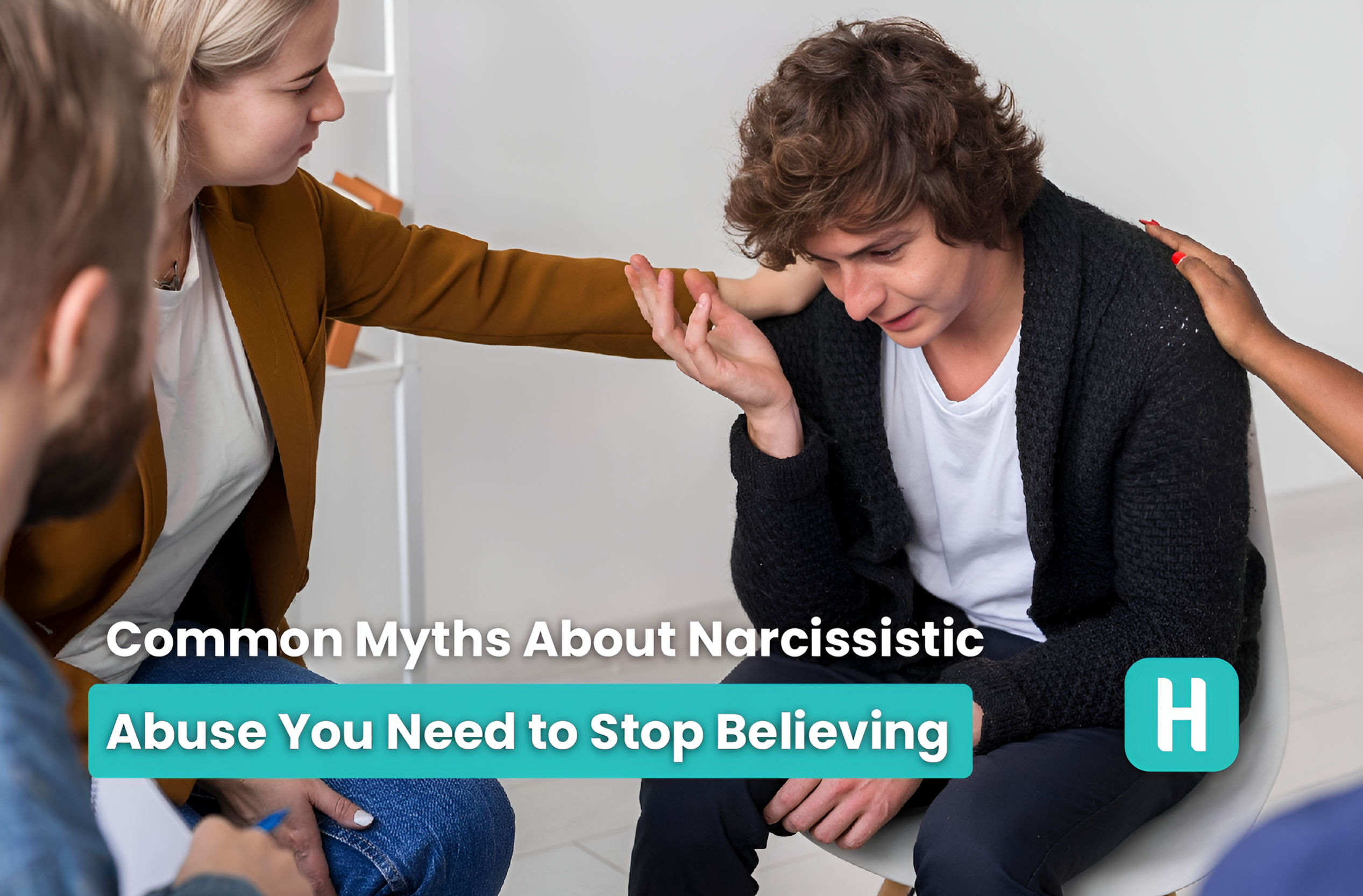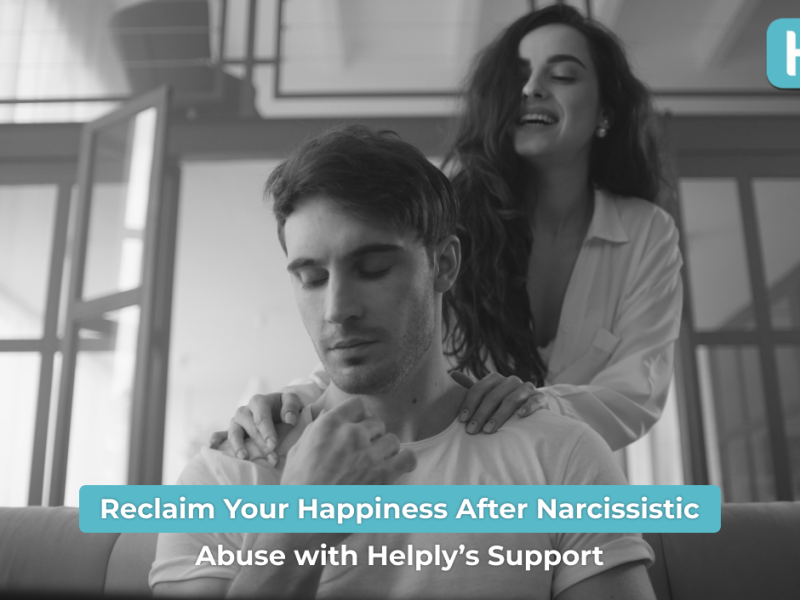It is the emotional and mental abuse that people inflict on others with narcissistic characteristics or Narcissistic Personality Disorder (NPD). Unfortunately, there are many narcissistic abuse myths that make it extremely difficult for victims to spot and come to terms with the fact that they are being abused.
Most people don’t know about Narcissistic abuse. It happens when someone with narcissistic traits uses emotional and psychological tricks to control and harm another person. They often make their victim feel small, powerless, and unsure of themselves. Narcissists do this to satisfy their own need for attention and control.
People who suffer from narcissistic tendencies lack empathy, think they are more important than others, and constantly seek praise. They may act superior and believe they deserve special treatment. To stay in control, they manipulate, criticize, and emotionally exploit others. This can make it difficult for victims to set boundaries or realize they are being mistreated. Victims often experience anxiety, depression, and other negative effects.
Addressing myths is crucial because misconceptions can:
- Prevent victims from seeking help.
- Normalize abusive behaviors.
- Cause confusion and self-blame for victims.
In this article, we discuss common myths about narcissistic abuse by answering very important questions on the same and giving helpful information for a better understanding of this very serious issue.
Myths of Narcissistic Abuse:
Myth 1: Narcissistic Abuse Only Applies to Romantic Relationships Truth:
Truth: Narcissistic Abuse Knows No Boundaries
People usually believe that the kind of abuse associated with a narcissist happens in romantic relationships. However, it can occur in any relationship-whether family, workplace, or with friends.

- Families as a Battleground: A narcissistic parent controls the life of his or her children, requiring constant praise without any concern about their feelings, which brings insecurity and long-term emotional pain. Similarly, a narcissistic sibling can use others for power and authority, causing arguments and bad feelings.
- Toxic Workspaces: Imagine a boss who takes credit for your ideas or a colleague who thrives on undermining your confidence. Narcissistic abuse in professional settings can crush morale and trap employees in a cycle of fear and dependency.
- Draining Friendships: A narcissistic friend often masquerades as caring while exploiting emotional vulnerabilities. Over time, their constant need for validation and control leaves their “friend” emotionally exhausted.
Myth 2: Narcissists Are Easy to Identify
Truth: They’re Masters of Disguise
One of the most dangerous narcissistic abuse myths is that narcissists are obvious and easy to identify. Narcissists don’t stroll around wearing a neon sign with the word Narcissist blazed across their forehead. No, they enthrall, dazzle, and disarm leaving their victim dazed until too late.

- Love Bombing: They initiate a relationship by unleashing a bombardment of compliments and attention in a bid to manufacture a false sense of trust.
- Subtle Manipulation: By gaslighting, they change what is real, making victims question what they see and remember. This helps the abuser stay in control while the victim feels more dependent.
- Emotional Entanglement: Narcissists use guilt, shame, and emotional blackmail to hold on tightly, making sure their victims stay stuck.
By addressing narcissistic abuse myths, we can help victims understand their situation, seek support, and rebuild their lives.
Myth 3: Victims Are Weak
Truth: Nobody is Immune
One of the most damaging myths about toxic relationships is that only weak individuals become victims. Narcissistic abuse doesn’t just hit the weak—it goes after the vulnerable parts of Even very confident people can be tricked by the clever strategy of a narcissist.
- Intelligence Isn’t Protection: A narcissist’s ways are made to get around your smart thinking. Their methods work on emotions, not logic.
- Emotional Exploitation: Narcissists are good at finding your insecurities and using them, no matter how small, to gain control.
Myth 4: Narcissistic Abuse is Physical
Truth: The Wounds Are Often Invisible
While physical violence is overtly damaging, narcissistic abuse typically manifests as mental and emotional manipulation that leaves deep, hidden wounds.
- Silent Assassin: Techniques such as gaslighting, silent treatment, and constant criticism slowly erode self-esteem, making victims question their worth and reality.
- Long-Term Consequences: Long-term effects include anxiety, depression, and PTSD, proving that psychological abuse can be just as damaging, if not more so, than physical harm.
Myth 5: Narcissists Can Be Changed with Therapy
Truth: True Change is Rare
Hope is strong, but when it comes to changing narcissists, it is usually not well placed. Real change needs empathy and self-awareness—qualities that narcissists do not have.
- Resistance to Growth: Narcissists hardly think they have any faults. Even in therapy, they often try to control the process instead of accepting it.
- Superficial Compliance: A narcissist may temporarily alter their behavior to regain control, but real change is hard to come by.
Myth 6: Leaving a Narcissist Brings Immediate Freedom
Truth: Emotional Liberation Takes Time
It’s a huge step to leave a narcissist, but it is not the end. Healing takes time and requires dealing with years of emotional manipulation.

- Trauma Bond: The cycle of abuse and affection from the narcissist creates emotional dependency. This bond needs to be broken by inner strength and external help.
- Healing the Mind: Therapy and support groups help to rebuild self-confidence, work through trauma, and regain the self.
Myth 7: Narcissistic Abuse is Rare
Truth: It’s All Around Us
One of the most pervasive emotional abuse misconceptions is that narcissistic abuse is uncommon. Narcissistic abuse doesn’t only exist in extreme cases. It thrives in everyday interactions, often hidden behind masks of charm and charisma. By learning to recognize the signs of narcissistic abuse, we can dismantle these toxic dynamics before they take root.
Therapy for Narcissistic Abuse
Have you ever been hurt by someone who made you feel small, controlled, or unworthy? Recovering from a narcissistic relationship can be overwhelming, leaving you unsure of how to rebuild your confidence and find peace again.
Helply is here to help you. We specialize in helping individuals recover from narcissistic relationship myths and understand the anguish of narcissistic abuse, ready to guide you on the road to healing. In our safe and secure environment, you can discuss your feelings and learn how to set boundaries again and regain self-worth. We will assist you in healing, moving forward, and having a healthier, happier future together.
Why Women Choose Helply for Narcissistic Abuse Therapy?
Helply provides a safe and supportive space for women recovering from the lasting effects of narcissistic abuse, including emotional, sexual, and physical trauma.
At Helply, we understand the impact of narcissistic relationships and are here to help you regain your strength, rebuild your confidence, and reclaim your life. Through focused therapy, support groups, and practical tools, we guide you on your journey to healing and reconnecting with yourself.


